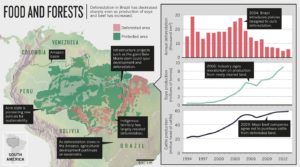Life in a Box – How Klabin Reinvented Itself

Is packaging the carbon scourge of the universe? You just moved to Cambridge and now you need to buy everything so you can call your new place ‘home’: from toilet paper to a new mattress. You start to buy online, but all that packaging pilling up is starting to concern you: is it the worst decision for the environment?
Packaging consumption is growing steadily and the Pulp & Paper industry has been historically damaging for the environment. Fortunately, that’s changing.
Klabin, Brazil’s largest paper producer and exporter, is a 117-year-old company that transformed itself and is now a global reference of sustainable practices – last year they were appointed by the Carbon Disclosure Project (CDP) Latin America as the company with the best practices in natural capital management [1].
As the leading manufacturer of paper and board for packaging in Brazil, the company attributes its success to its long-term focus on sustainability and innovation. As showed on Exhibit 1, the company extract wood to manufacture different types of packaging products that are then used for local consumption or exported globally.
Exhibit 1: Klabin’s Production Process
Source: “Sustainability at Klabin 2015”, Company Report. May, 2016.
How is Klabin affected?
From increasing the average global temperature to rising of sea levels, climate changing is consensually impacting the way we do business and private sectors are being accounted reliable for their influence in the economic direction and how resources are used globally [2]. In that context, forests preservation becomes even more relevant as they play an important role in the global carbon cycle. They act by “absorbing approximately one-fourth of anthropogenic CO2 emissions, storing large carbon pools in tree biomass and forest soils, and modulating the land atmosphere exchange of energy and water vapor. […] Forest losses amplify the diurnal temperature variation an increase the mean and maximum air temperature” [3].
Nonetheless, deforestation has been for a long time a problem in the sector, especially in developing countries that lack the resources for appropriate surveillance. With clandestine companies sourcing from illegal forest reserves at lower cost than responsible ones, Klabin suffered from unfair price competition. The grown awareness about how the various constituents in the market can promote or avoid such behaviors by globally selecting the right partners fueled the growth of sustainable conscious companies, such as Klabin. In Brazil, the change started in 2004 when the government strengthened the Brazilian Institute of Environment and Renewable Natural Resources (IBAMA), especially by combating corruption inside the organization [4], which ultimately led to a partial recovery of the forest, see Exhibit 2, and a fairer market setting. Global agreements, environmental groups such as Greenpeace and public pressure increased the scrutiny and made regulations stricter in the sector. Increasingly, sustainability is globally perceived as a pivotal element in the success of Pulp & Paper companies [5].
Exhibit 2: Evolution of deforestation in Brazil
Source: “Stopping deforestation: Battle for the Amazon”, Nature, 01 Apr 2015.
How had Klabin adapted?
Klabin created a Climate Committee to continuously identify the important challenges threatening their business and implement solutions to the climate changing phenomenon. From cleaner fuel to less water usage during production process, the results differentiated Klabin from local players and elevated the company to best-in-class standards. They had voluntarily adhered to renowned institutions’ commitments and earned several certifications:
Environmental Performance Report 2015 – World Wildlife Fund (WWF): achieved an 82% success rate in the report [6].
Best Natural Capital Management Practices: Carbon Disclosure Project (CDP) Latin America 2015. Recognized for the Best Natural Capital Management Practices [6]. CDP is a not-for-profit organization fostering transparency in the impact of companies and their data analysis help investors make decisions based on the social impact and risks of companies [7].
FSC® – FOREST STEWARDSHIP COUNCIL® (C020857): Under the slogan “Forest for all forever”, FSC incentivize environmentally appropriate forest management and certifies companies that follows their ten principles, including maintaining and enhancing long term economic, social and environmental benefits from the forest [8]. All Klabin’s business in Brazil are certified by FSC® [6].
ISO 14001: This certifies that Klabin follows the standard tools and has the adequate environmental system to manage its environmental responsibilities [9].
Other certifications owned by the company are OK COMPOST, FSSC 22000, ISEGA, ISO 9001 and OHSAS 18001.
What’s next?
Klabin has dramatically reinvented itself and is well positioned to lead the innovation in the segment and make the whole industry better for the environment. I believe as a next step that Klabin should focus on talent attraction/retention to drive this new and innovative culture forward and keep itself ahead in the market. As pointed by a Montreal-based innovative competitor, “the focus on sustainability, […] makes us more sustainable in the war for talent can. It becomes this virtuous circle of sustainability at every compass point” [10]. The market is changing rapidly, the impact of climate change is growing exponentially and I truly believe the right people can make the difference, in this company and in the world.
(Word Count: 795)
Endnotes:
- “Klabin elected as company with best practice of Natural Capital Management by CDP”. PPI Pulp & Paper News Service. 04 Nov, 2015.
- “Sustainability: The corporate climate overhaul”, Nature. 07 Jun, 2012.
- “Biophysical climate impacts of recent changes in global forest cover”. http://science.sciencemag.org/content/351/6273/600. Science. 05 Feb, 2016.
- “Stopping deforestation: Battle for the Amazon”. http://www.nature.com/news/stoppingdeforestationbattlefortheamazon1.17223. Nature. 01 Apr, 2015.
- “The role of environmental regulation in the future competitiveness of the pulp and paper industry: the case of the sulfur emissions directive in Northern Europe”. http://www.sciencedirect.com.ezp-prod1.hul.harvard.edu/science/article/pii/S0959652615007131. 03 June, 2015.
- “Sustainability at Klabin 2015”, Company Report. https://www.klabin.com.br/en/press/news/klabin-presents-the-2015-sustainability-report/. 31 May, 2016.
- Carbon Disclosure Project (CDP), https://www.cdp.net/en.
- Forest Stewardship Council, https://ic.fsc.org/en.
- “ISO 14000”, http://www.iso.org/iso/home/standards/management-standards/iso14000.htm.
- “Old Industry, New Tech: Domtar’s Focus on Sustainability”, MIT Sloan Management Review. Oct 2013.
- “Just how bad is online shopping? There is a lot to unpack”. http://grist.org/article/just-how-bad-is-online-shopping-theres-a-lot-to-unpack/. 05 Oct, 2016.
Photo Credits:
Cover Photo: “MONKEY”. The Outdoor Advert titled MONKEY was done by J. Walter Thompson Sao Paulo advertising agency in Brazil. It was released in Sep 2005. https://www.coloribus.com/adsarchive/outdoor/atlantic-forest-conservation-monkey-7664505/. Accessed 04 Nov, 2016.





Klabin is setting a great example of responsible sourcing. The increase in e-commerce is driving up demand for boxes and delivery cartons at an alarming pace, which will require multiple players along the supply chain (from production of packaging, to usage and ultimately delivery of products requiring the packaging) to reduce waste. Klabin is innovating on the production side, but it is also important for companies that buy carboard boxes and other paper products to minimize how much packaging they need – e.g. an American company called Packsize has invented machinery that customizes each box size and configuration to what a particular product requires real-time as the orders come into the factory. I think companies need to cooperate vertically to maximize impact.
This is very interesting and I am particularly glad to see the statistics about decreased levels of deforestation in recent years. I wonder what Klabin is doing about its downstream supply chain – i.e. transporting finished products to customers in the U.S. and elsewhere. Perhaps by controlling more of the shipping process directly, Klabin could find synergies that would enable lower carbon emissions throughout the supply chain. I also wonder whether increased levels of recycling in different parts of the world will cut into Klabin’s market potential and in fact hinder sales, despite the growth in consumption of paper and cardboard. Is Klabin truly incentivized to take daring steps to reduce waste from paper products on the customer side?
It is very interesting to read to read about a paper and boards company and its journey towards sustainability. I agree with you that having a sustainability focus will help the company bring in talent that wants to work on meaningful projects and are passionate towards growth and sustainability. Cleaner fuel, less water usage are great initiatives but I would look for Klabin to take this a step forward and see how it can influence other players in the industry for industry wide sustainability practices. Any partnership within this sector can help save the deforestation and climate change associated with it quite dramatically.
Very interesting article. Apart from sourcing, what is Klabin doing to influence it’s downstream chain as well as consumers to be more sustainable. Can it push for more creative ways of packaging that requires less paper use. Can Klabin come up with new innovative materials that are sustainable? As they hire more talented people maybe this is a lever they can pull.
I’m encouraged to read about a company like Klabin operating in Brazil. In my experience, many of the companies setting high standards for sustainability within their industries are in the developed work (e.g., IKEA), so it’s great to see a homegrown Brazilian company taking a stand. I’d be interested to know whether their sustainability processes increase their prices relative to competitors with similar quality products (I imagine there’s a bit of a premium involved.) I’m also curious to know where Klabin’s main buyers are located – are they in the developed world, or are there also local buyers who are willing to pay a premium for Klabin’s products?